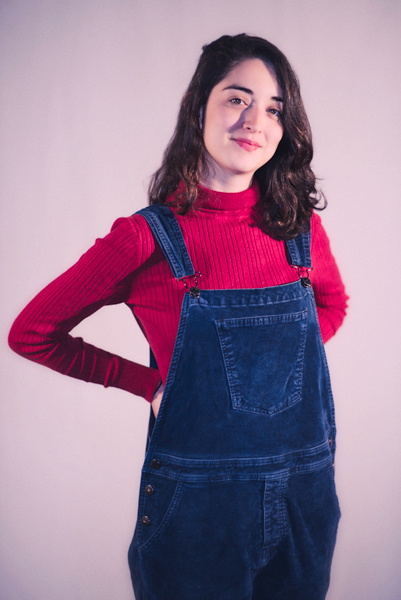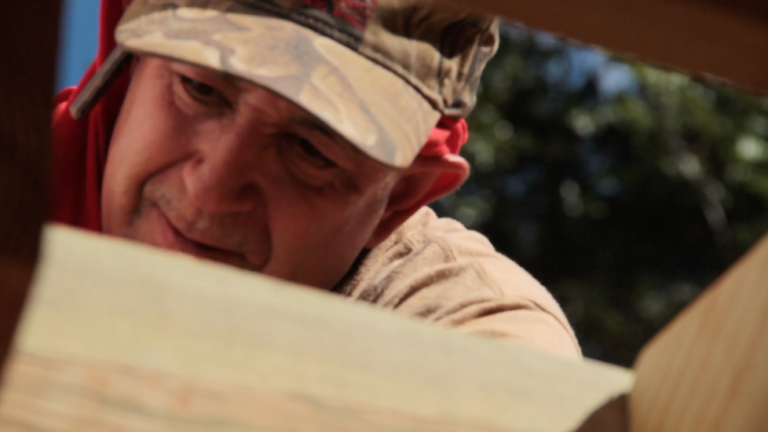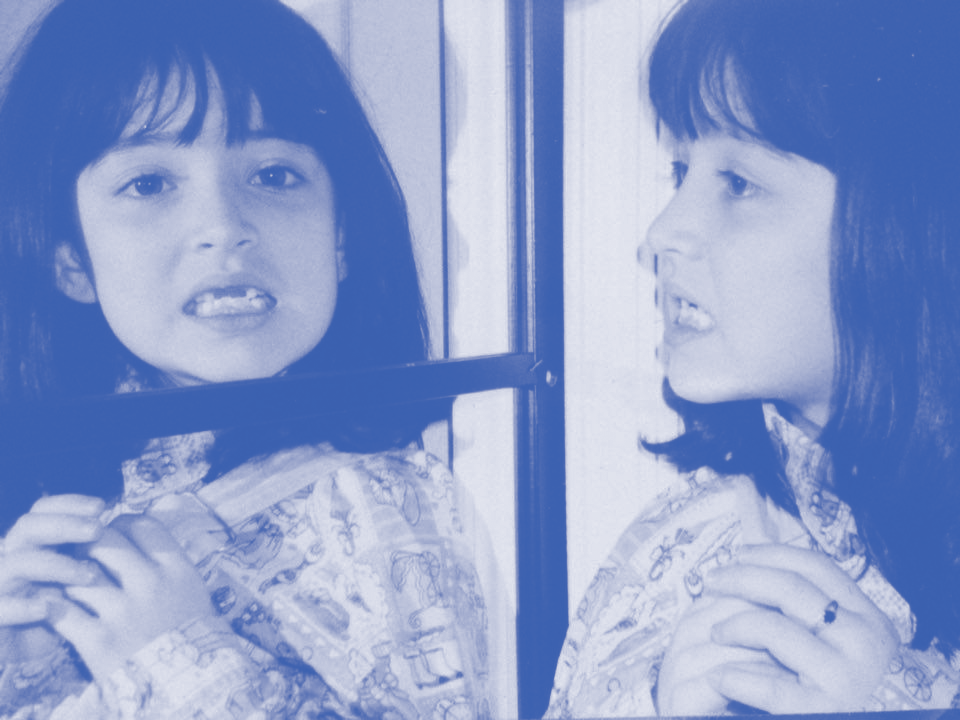One of the most unnerving questions that exists in the world is “where are you from?” There’s a universe of responses to such a loaded question, all of them having to do with place, identity, and experience. It’s a very particular tension that Danielle Calle, a first-generation Colombian-American artist and filmmaker, knows all too well. (Disclaimer: Calle and I know each other personally, via mutual friends in New Orleans). “When people ask me ‘where are you from?’ I say both New York and South Carolina because they’re both a really big part of who I am, although technically New York is the place I’ve lived in the longest of all the cities I’ve lived in,” she says. “I only lived in South Carolina for six years before I went off to college…but they were the most formative years, middle school and high school. I was always negotiating things about myself while I was there.”
In her work, Calle often explores the tension of being simultaneously first-generation and origin-less. She originally came to film through a nascent love of music. Growing up, there were always instruments around, as her father was in a touring band back in Colombia. She taught herself how to play the guitar and piano. Soon, she was directing and editing music videos starring her siblings (set to the likes of Franz Ferdinand’s “Jacqueline,” a song her youngest sister shares a name with). Later on, Calle went to a specialized arts high school, the Fine Arts Center in Greenville, where she was exposed to paradigm-shifting films like The Seventh Seal and The Graduate, and in her spare time, pored over DVDs she rented from the library.
My parents live in the Bible Belt south and there are no white people in this documentary.
But when Calle went off to The University of Chicago, where she studied Cinema and Media Studies, Calle says she both felt “totally removed from my Colombian-ness” and stifled by the lack of options concerning Latin-American films in the program. “We took international cinema classes and they never discussed cinema from places outside of Europe, or besides the one or two Asian films that we would watch,” she says. “It was way bullshit. And there were specialized classes—a friend took an Indian cinema class—but when I was there, there was no Latin American cinema class. So I took it upon myself to be like, ‘Alright, I need to learn. This is an extension of my cultural heritage in that we’ve inherited these images, and I want to study them.’” That interest led her to focus on how sound is used in US cinema vs. Mexican cinema, among other things.

Following her second year of college, as part of the Jeff Metcalf Internship program, she worked as an intern for the New Orleans Film Society. She began working there full-time after graduation, first as a Communications Manager and then as a Programming Coordinator, and was in New Orleans for a total of about four years. “It’s great to program films—it really is its own kind of film school,” Calle says. “And I think at first that was definitely the vibe I was on. It was very exciting; there was incredible talent out there. But for a second there I felt so frustrated not being able to make films, because I had a traditional day job and felt kind of stuck. I was watching all of this incredible content and I was like, ‘Oh man, what am I doing to add to those?’”
“I don’t want to be niche-fied; I’m worldwide.”
Several months ago, Calle moved back to South Carolina and started bringing several projects to fruition. One of those is A Day’s Work, a short film that premiered at the New Orleans Film Festival in the fall of 2016 and that will also be screening at Indie Grits. It’s a film that Calle made after receiving a Magnifying Glass grant; with it, she had originally set out to capture her parents’ gnarled political views. But during the filmmaking process, Calle ended up drastically changing the project’s scope. “It turned into a very minimalistic observational footage of my parents and their day: It’s my dad building a staircase and my mom teaching a group of kids Spanish,” Calle describes. “They live in the Bible Belt south and there are no white people in this documentary. White people do not enter their space at any point in their day unless they go to a store or whatever. But it’s an observation of what they do as working people.”

The second of Calle’s Indie Grits projects is a print piece entitled “You Are Here.” The risograph-printed poster doubles as a foldable, handheld map of memories that detail “our first impressions as kids living in the South, and negotiating what it means to be Colombian-American or Latinx,” as Calle describes it. To create the piece, Calle dug through photos and plucked out several images, mainly of her sisters and her female cousins, who had all arrived in South Carolina either from Colombia or New York. She then spliced them with quotes from each person that described the challenges of their first few years hunkering down in the brave new world of the Deep South. The minimalist piece, which cleverly uses shades of red, white and blue to render the constant making of a new America by immigrants, also draws from a prominent South Carolina license plate slogan: “Smiling faces, beautiful place.”
“The picture is a cheeky take on that, and representative of the resistance we had as kids without even realizing,” Calle says of the piece. ““We all stuck together; I kind of had like a girl gang with me, which was really cool…something about these images and us as preteens and teens in the early 2000s, something about it felt very royal to me. I’m really thankful for that era because it was a really hard time, and it was important that we were all together.”

It was especially hard, given that it was the first time some members of Calle’s family had been in the United States at all. One of her cousins, for instance, described to Calle about how she was ashamed to speak Spanish in public after moving to Greenville from Colombia. “She was like, after a year or two, I kind of just stopped, “Calle recalls. “I think it was when you guys came [to Greenville], that really helped, it made me feel part of a group. And that’s her quote: Realizing that that’s not an extraordinary thing, to speak Spanish in public. It’s okay. We helped her normalize it, accept it and make her feel better as a straight up immigrant.”
The “You Are Here” map will also be accompanied by a video piece that Calle made with the help of the Algae Kids, a glitch and video art group. The complementary video remixes photos, home footage and other splices of Calle and her family’s initial years arriving and settling in the South, to give the feeling that you’re watching old and archival materials. “You learn about Southern history and about all these major figures, and you’re not reminded enough that you’re actively participating in history and writing it,” she says. “There’s a huge community now of Colombians in Greenville, and other kinds of Latin Americans, and we’re part of that history, too.”
Latinos are actively participating in Southern history, and writing it.
Keeping a record is something that becomes of utmost important with age, and rewriting history has especially become a critical part of our current zeitgeist, too, where we’re deconstructing the systems and the origins of everything. It’s certainly not the only thing on Calle’s mind, though. She has so many more complexities, of the South and Latinx life and beyond, that she’s currently imagining and questioning. These themes will undoubtedly materialize into something seismic and surprising down the line, especially as she’s set to start graduate school in the fall at NYU’s Moving Image Archiving and Preservation Program and part-time work at the Museum of the Moving Image.
“Recently, a well meaning person was like, ‘I think you have an interesting voice as a Latina in the South and that could be your niche,’” Calle says. “Uh…thanks but no thanks? This is something I have to do just for my own sake. Ever since going to college, day to day life has not been totally in sync with who I am. That bilingual side, that whole other culture? That’s where I come from. And day-to-day life does not look like that at all. It’s very alienating. It’s something I have to do but I don’t only want to make stuff about this. I don’t want to be niche-fied; I’m worldwide.”
Indie Grits runs April 20-23, 2017 at The Nickelodeon Theater in Columbia, South Carolina.







